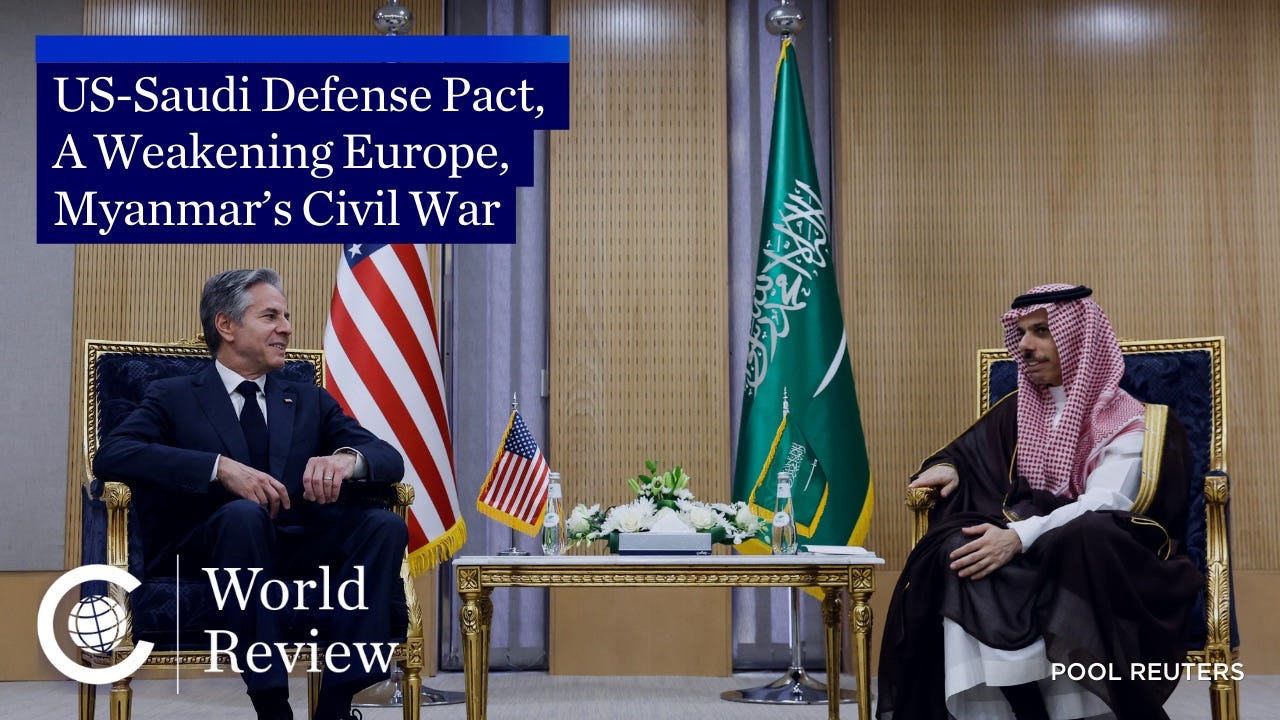World Review: US-Saudi Defense Pact, A Weakening Europe, Myanmar’s Civil War
A brief synopsis of this week's show
Each Friday morning, I host a video podcast called “World Review with Ivo Daalder” where three journalists from major news outlets around the world join me in discussing the latest global news stories of the week.
This morning, May 3, I was joined by Deborah Amos of Princeton University, Steven Erlanger of The New York Times, and Giles Whittell.
“World Review is always fascinating. I love the fact that you can get journalists from around the world to participate since zoom is the medium.”
— A Subscriber to America Abroad
While I encourage you to watch or listen to the episode (and subscribe wherever you get your podcasts!), here are a few interesting points I took away from our discussion:
The United States and Saudi Arabia have been negotiating an intricate deal providing Saudi with a US security guarantee and help for a civilian nuclear program, the US with an end of China’s influence in Saudi, Israel with normalization of relations with the most important Arab country in the Gulf, and the Palestinians with a pathway to their own state. The Hamas attacks of October 7 appeared to have all but killed the deal, but it refuses to die as both Washington and Riyadh seek the political, economic, and strategic benefits of it coming to fruition. The biggest immediate obstacle to finalizing the deal, Deb argued, is the continuing war in Gaza. Saudi is demanding a ceasefire as the first step of the deal, something Israel is prepared to accept on a temporary basis only, and Hamas leaders insists needs to be permanent. Neither the Hamas leadership in Gaza nor the Israeli Cabinet appears willing to accept the other’s demand. Hamas leaders see the remaining hostages as the key to their security so long as the war continues. Netanyahu needs to finish the war to dismantle Hamas to ensure his continued political survival. Despite lots of diplomacy, the situation remains stuck where it has been since the last pause in fighting end in November.
French President Emmanuel Macron gave a major speech in Paris last week and another big interview to The Economist this week, painting a dark picture of the future of Europe. “Europe can die,” Macron warned in his speech. It needs to respond to the triple challenge of a renewed security threat from Russia at a time when the US security guarantee may no longer be reliable, the technological advances by China and the United States for which Europe has no answer, and the deepening attacks on democracy from both within and without European societies. As always, Giles noted, Macron’s analysis is on point, but he doesn’t appear to have a strategy for addressing them. That’s particularly true for the technological challenge and the threats to democracy, with right-wing parties in France now outpolling his own. But Macron appears to hope that a major conference in July of the European Political Community might reset the security picture, drawing Britain into closer security alignment with Europe and convincing countries in central and eastern Europe that France and the UK, if not Germany, now share their view of the major security threat facing the continent.
Long ignored in the press, the situation in Burma is changing rapidly. Steve recounted how a country united only in the middle of the last century has gone through periodic cycles of military rule, protests, liberalization if not democratization, and back to military rule. We’re in the latest iteration, with the junta that took power three years ago now facing significant opposition from disparate rebel forces that have united to challenge the country’s rulers. The rebels have made significant gains in recent months, putting the junta on its back feet. But the question that remains unresolved is what would happen if the rebels win? The country has always been divided, and its fragmentation has been readily exploited by neighboring countries, organized criminals, and unscrupulous business people. Will this time be different?
That’s it for my quick takes of this week’s episode here on America Abroad. To get the full flavor, please listen to the episode itself.



